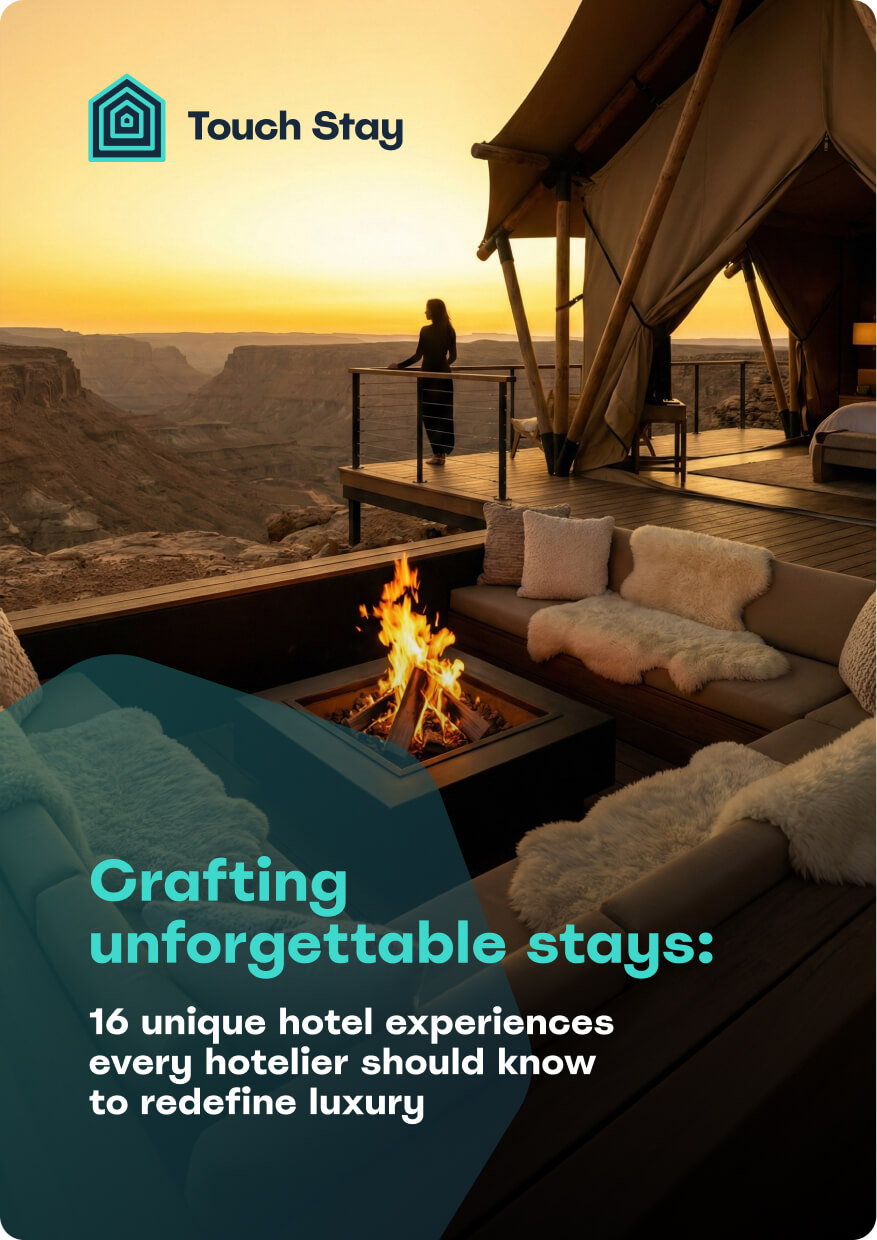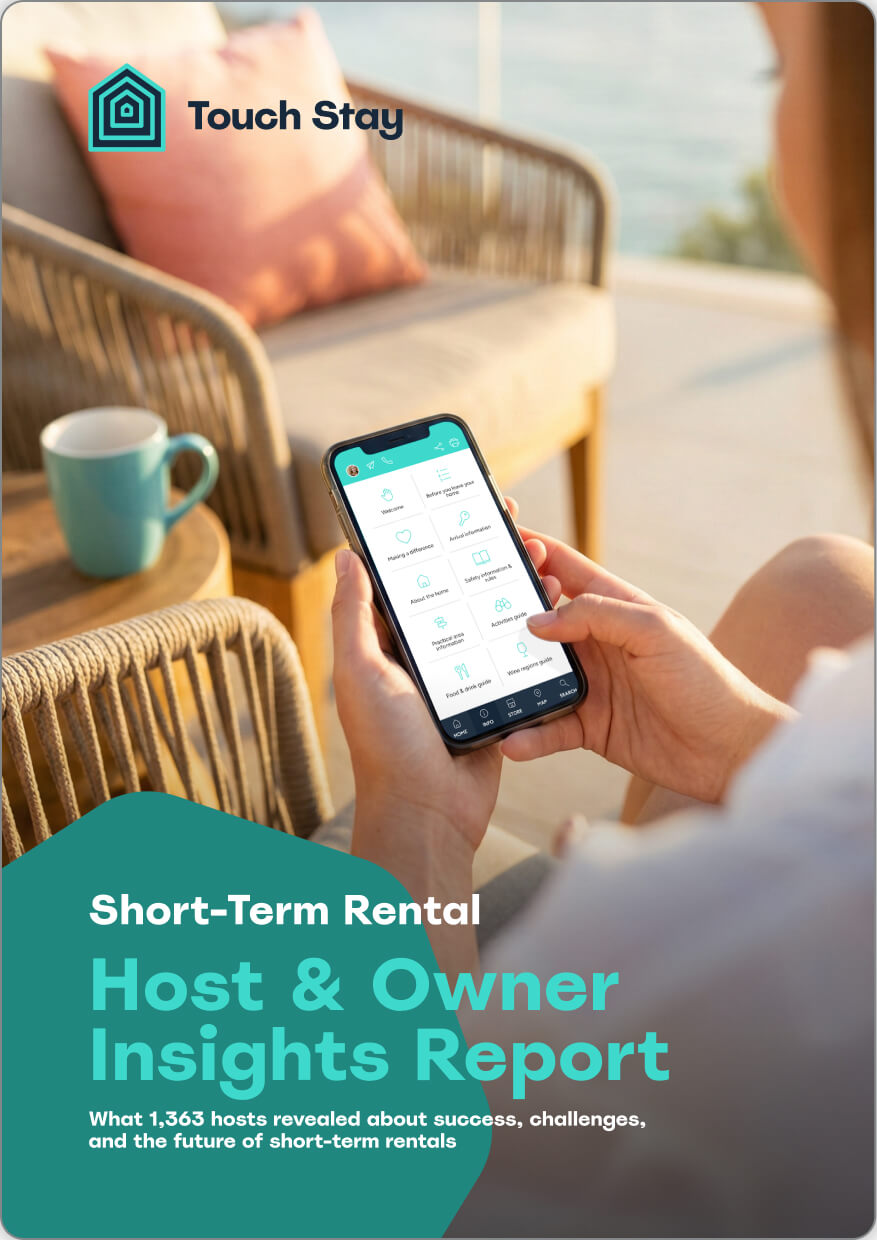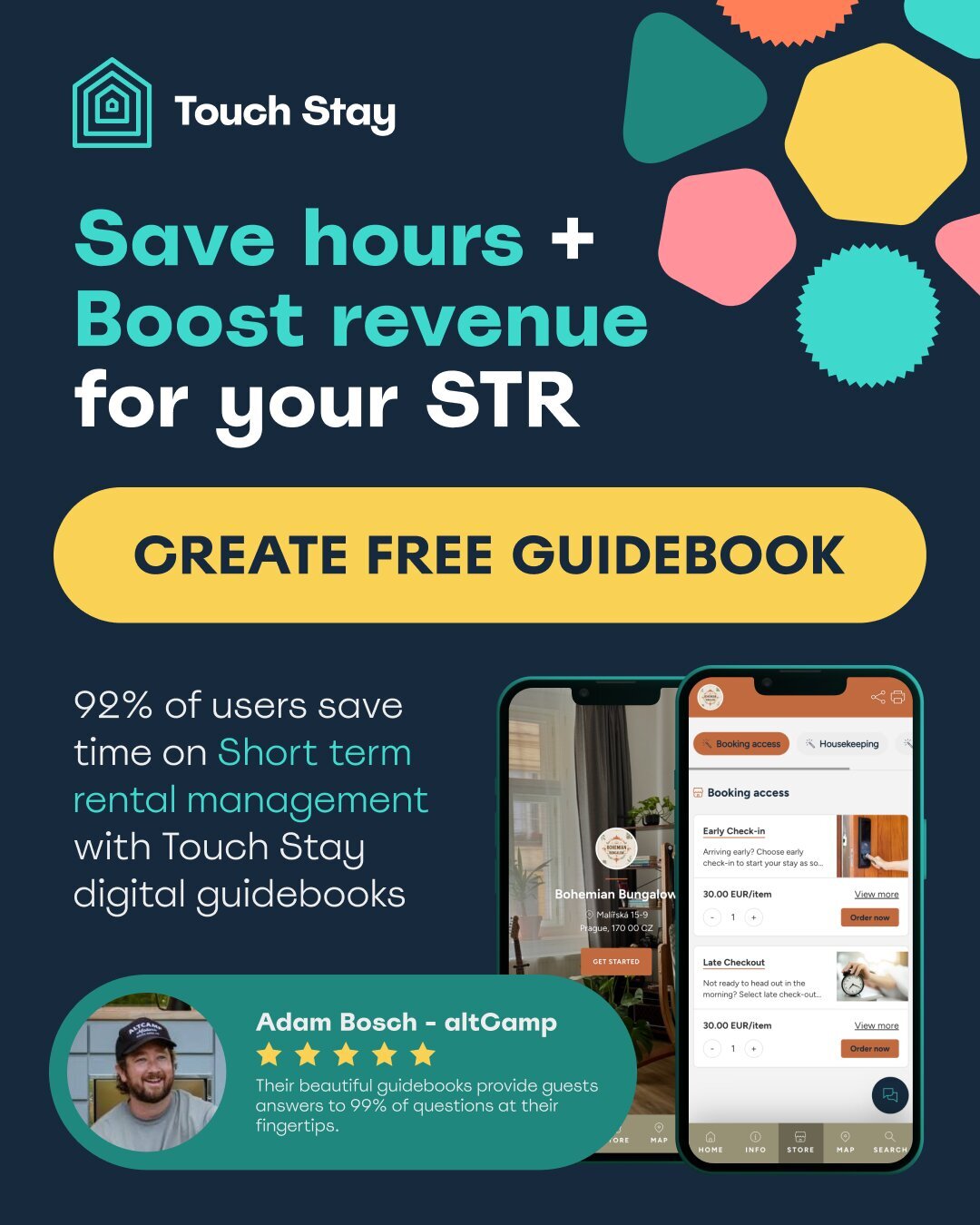The world of hospitality is changing, and short-term rentals are at the forefront of this evolution. Whether you're a seasoned traveller who prefers the flexibility of a home away from home or a curious homeowner considering venturing into this exciting market, this comprehensive guide is here to equip you with everything you need to know.
Want to streamline your short-term rental journey while effortlessly enhancing the guest experience? Check out our digital guidebooks specially designed for short-term rental hosts like you!
Are you an Airbnb owner? Save significant time and boost guest satisfaction with a Touch Stay digital guidebook!
Generate your guidebook in seconds
Simply paste your Airbnb or Booking listing link. No card required.
This blog explores all aspects of short-term rentals, answering your questions and setting you on the path to success. Dive into the sections below to learn about:
- What is a short-term rental?
- How do short-term rentals work?
- Short-term vs. long-term house rentals
- Types of short-term rentals
- Benefits and drawbacks of short-term rentals
- How do local governments perceive short-term rentals?
- How to start a short-term rental business
- The exciting world of short-term rentals: your journey starts here
- Frequently Asked Questions (FAQs) to address common concerns
Let's embark on this journey and unlock the potential of short-term rentals!
What is a short-term rental?
Imagine a cosy cabin tucked away in the mountains, a modern apartment in the heart of the city, or a charming beach house by the ocean. All these properties can be short-term rentals, offering travellers a unique alternative to traditional hotels.
In essence, a short-term rental is a fully furnished property available for rent for a short period, typically ranging from a few days to a few months. These rentals are advertised and managed through online platforms like Airbnb, Vrbo, and Booking.com, allowing hosts to connect directly with guests seeking a comfortable and immersive experience.
Here are some examples of short-term rentals:
- Vacation homes: perfect for families or large groups seeking spacious accommodations in a scenic location.
- City apartments: ideal for business travellers or couples desiring a convenient and central location.
- Unique properties: from treehouses to converted barns, these offer a one-of-a-kind experience for adventurous travellers.
Ready to unlock the potential of your property as a short-term rental?
Get started with a free trial of Touch Stay's digital guidebook platform!
How do short-term rentals work?
The concept of short-term rentals is straightforward. Hosts list their properties on online platforms, showcasing photos, amenities, and pricing. Guests browse these platforms, compare options, and book their desired rentals directly with the host. Communication usually takes place through the platform's messaging system, making the booking process efficient and convenient.
Once booked, guests gain temporary access to the property for the agreed-upon period. Hosts are responsible for ensuring the property is clean, well-maintained, and equipped with everything guests might need for their stay.
Short-term rental platforms typically charge both guests and hosts a service fee. The specific fees can vary depending on the platform and the rental price. Additionally, hosts might need to pay for cleaning services, property insurance, and other operational costs.
Short-term vs. long-term house rentals
While both involve renting out a property, short-term and long-term rentals cater to distinct needs. Let's explore the key differences:
Short-term rentals
- Rental term: typically days or weeks, up to a few months
- Guests: travellers seeking a temporary accommodation
- Turnover rate: high, with frequent guest changeovers
- Management: requires more active involvement from the host to manage bookings, guest communication, and cleaning
- Income potential: can be higher than long-term rentals depending on location and seasonality
Long-term rentals
- Rental term: months or even years
- Guests: tenants seeking a permanent home
- Turnover rate: low, with longer stays between tenants
- Management: generally less hands-on
- Income potential: can offer stable income but potentially lower than short-term rentals
Choosing between a short-term or long-term rental depends on your goals and preferences. If you enjoy interacting with people and managing a dynamic environment, short-term rentals might be a good fit. Conversely, if you prioritise a stable income stream and less hands-on management, long-term rentals might be preferable.
Types of short-term rentals
The beauty of short-term rentals lies in their variety, offering something for every traveler's needs and budget. Let's explore the most common types:
a) Entire house
This classic option provides guests with exclusive access to an entire property, including bedrooms, bathrooms, living areas, and kitchen. It's perfect for families, groups of friends, or anyone seeking privacy and independence.
b) Accessory dwelling units (ADUs)
ADUs, also known as granny flats or in-law suites, are self-contained living spaces located on the same property as the main house. They offer guests a separate entrance and private amenities, making them ideal for couples or solo travellers.
c) Individual rooms
Similar to a traditional bed and breakfast, this option allows guests to rent a single room within a shared house or apartment. Hosts typically provide access to common areas like the kitchen and living room. It's a budget-friendly choice for budget travellers and backpackers.
Benefits and drawbacks of short-term rentals
Becoming a short-term rental host can be a rewarding venture, but it's important to weigh the pros and cons before diving in.
| Pros | Cons |
| Higher income potential | Time commitment |
| Flexibility | Wear and tear |
| Tax benefits | Local regulations |
| Personal satisfaction | Guest variability |
Pros of short-term rental houses
- Higher income potential: short-term rentals often generate higher income compared to long-term rentals, especially in popular tourist destinations.
- Flexibility: you have the freedom to set your own rates and availability, adapting to seasonal demand.
- Tax benefits: in some regions, short-term rental hosts may be eligible for tax deductions and credits.
- Personal satisfaction: hosting guests from diverse backgrounds can be a fulfilling experience.
Cons of short-term rental houses
- Time commitment: managing bookings, guest communication, and property maintenance requires significant time and effort.
- Wear and tear: frequent guest turnover can lead to faster property wear and tear, necessitating regular maintenance and repairs.
- Local regulations: many cities have specific regulations governing short-term rentals, which you must comply with.
- Guest variability: dealing with different guests can be challenging, and occasional negative experiences might occur.
Simplify your short-term rental management with Touch Stay's digital guidebooks. Automate check-in, provide essential information, and enhance the guest experience.
How do local governments perceive short-term rentals?
Local governments have varying attitudes towards short-term rentals. Some cities embrace them as a way to boost tourism and economic growth, while others impose strict regulations to address concerns like noise complaints and overcrowding.
Before starting a short-term rental business, it's crucial to research your local regulations. Contact your city's planning department or tourism board to understand the specific requirements and obtain any necessary permits or licenses.
How to start a short-term rental business
Ready to embark on your short-term rental journey? Here's a step-by-step guide to help you get started:
1. Obtain any required business licenses
Check your local regulations to determine if you need a business license or permit to operate a short-term rental. Some cities require specific licenses for short-term rentals, while others might include them under general business licenses.
Everything you’ll need to know about starting your own short-term rental business is included in our B&B business plan, which even includes a free template to ensure you hit the ground running!
2. Create attractive listings on rental platforms
Your online listing is the first impression potential guests will have of your property. Invest time in creating a compelling listing that highlights your property's unique features and amenities. Use high-quality photos, write engaging descriptions, and set competitive rates.
Check out our guide on how to write the perfect listing for your short-term rental property.
3. Prepare your property for guests
Ensure your property is clean, well-maintained, and equipped with all the essentials guests might need. Consider investing in comfortable bedding, towels, kitchenware, and basic toiletries.
4. Use digital welcome books for guests
A digital welcome book is a game-changer for short-term rental hosts. It provides guests with essential information about the property, local attractions, and nearby amenities. With a digital welcome book from Touch Stay, you can automate check-in, reduce guest inquiries, and elevate their overall experience.
5. Ask for reviews and feedback
Encouraging guests to leave reviews can significantly impact your future bookings. Positive reviews build trust and attract more guests. Respond to reviews, both positive and negative, in a professional and timely manner.
6. Focus on maintenance
Regular maintenance is crucial for keeping your property in top condition. Address any issues promptly to avoid negative reviews and potential damages. Touch Stay’s First Impressions feature was designed specially with this in mind. It lets you get ahead of any snags in the make-or-break first hours of a guests’ stay.
The exciting world of short-term rentals: your journey starts here
The world of hospitality is evolving, and short-term rentals are taking centre stage. Whether you're a seasoned traveller seeking a homey haven or a curious homeowner considering this exciting market, this comprehensive guide has equipped you with the knowledge to navigate your path.
Ready to unlock the full potential of your short-term rental venture? Touch Stay's digital guidebooks can streamline your operations and elevate the guest experience. Imagine automated check-in, readily available information at guests' fingertips, and a seamless experience that fosters positive reviews.
FAQ
Contact your local government's planning department or tourism board to enquire about short-term rental regulations in your area.
Most properties, including houses, apartments, condos, and even unique spaces like boats or RVs, can be listed as short-term rentals, subject to local regulations.
While short-term rentals offer numerous benefits, there are potential risks to consider, such as property damage, liability issues, and dealing with difficult guests.
Profitability depends on various factors, including location, property size, occupancy rates, and operating costs. Research your local market and consider using a short-term rental calculator to estimate potential earnings.
The best platform for you depends on your specific needs and target market. Popular options include Airbnb, VRBO, and Booking.com. Consider factors like fees, reach, and features when choosing a platform.

Ned
Ned has clocked up over 11 years in digital marketing and comms, with a strong focus on creating engaging content for a range of brands and agencies. When he’s not writing, he can be found digging for records, peering through his telescope at the night sky, or onboard his local lifeboat where he volunteers as a crewmember.
Be the first to know!
Join our newsletter for early access to:
- ✅ Free guides
- ✅ Pro tips & tricks
- ✅ Time saving tutorials
- ✅ Latest blog posts
- ✅ Checklists & templates






















.webp?width=50)